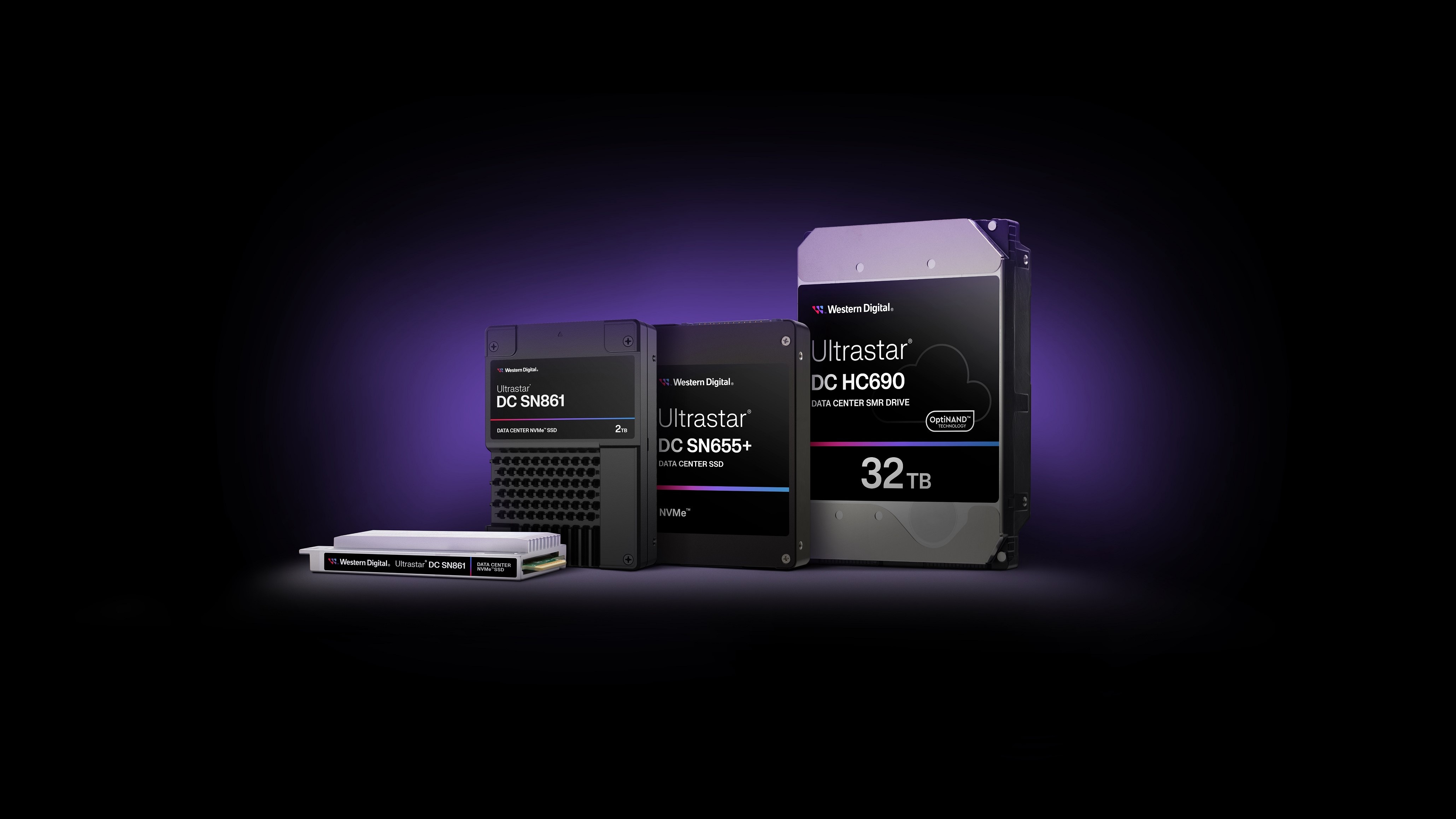오늘날 AI 모델은 새로운 독창적인 데이터를 생산하는 동시에 텍스트, 이미지, 오디오, 비디오 등을 처리하는 연속적인 데이터 생성과 소비의 반복을 기반으로 작동한다. AI 기술이 발전함에 따라 데이터 스토리지 시스템은 대량의 데이터를 관리하면서 방대하고 복잡한 모델에 요구되는 컴퓨팅 로드와 속도를 지원하는 것이 중요하다.

▲웨스턴디지털 'AI 데이터 사이클' 제품군 / (사진 : WD)
AI 워크로드용 스토리지 솔루션 발표
오늘날 AI 모델은 새로운 독창적인 데이터를 생산하는 동시에 텍스트, 이미지, 오디오, 비디오 등을 처리하는 연속적인 데이터 생성과 소비의 반복을 기반으로 작동한다. AI 기술이 발전함에 따라 데이터 스토리지 시스템은 대량의 데이터를 관리하면서 방대하고 복잡한 모델에 요구되는 컴퓨팅 로드와 속도를 지원하는 것이 중요하다.
스토리지 솔루션 기업 웨스턴디지털(WD)이 대규모 AI 워크로드를 위한 이상적인 스토리지 구성을 정의하는 6 단계 AI 데이터 사이클 프레임워크를 11일 공개했다. 이와 함께 △울트라스타 DC SN861 SSD(Ultrastar DC SN861 SSD) △울트라스타 DC SN655 SSD(Ultrastar DC SN655 SSD) △울트라스타 DC HC690 울트라SMR HDD(Ultrastar DC HC690 UltraSMR HDD)’를 함께 발표했다.
새로운 AI 데이터 사이클 프레임워크는 고객이 인공지능(AI) 분야 투자 효과 극대화, 효율성 향상, AI 워크플로우 총소유비용(TCO) 절감을 위한 고도화된 스토리지 인프라를 계획하고 구축할 수 있게끔 지원한다.
웨스턴디지털은 AI 훈련 및 추론을 지원하는 고성능 PCIe Gen5 SSD, 고속 AI 데이터 레이크를 위한 대용량 64TB SSD, 비용 효율적인 대규모 스토리지를 제공하는 ePMR 울트라SMR 32TB HDD 등 신제품을 선보이며 AI 데이터 사이클의 핵심 단계에 필요한 스토리지 요구사항에 부합하는 플래시 메모리와 HDD 제품 및 기술 로드맵을 구축하게 됐다.
울트라스타 DC SN861 SSD는 웨스턴디지털의 첫 엔터프라이즈급 PCIe Gen 5.0 솔루션으로, AI 워크로드를 위한 탁월한 랜덤 읽기 성능과 최고 수준의 전력 효율성을 지원한다. 최대 16TB 용량에 거대언어모델(LLM) 훈련 및 추론, AI 서비스 적용 등을 위한 초저지연성과 반응성을 바탕으로 이전 세대 대비 최대 3배 빠른 랜덤 읽기 성능을 제공한다.
또한 낮은 전력 프로필을 통해 더욱 낮은 와트 당 초당입출력처리속도(IOPS/Watt)를 가능하게 하며 절감된 전체 TCO를 지원한다. 향상된 PCIe Gen5 대역폭은 빠른 속도의 가속화된 컴퓨팅과 컴퓨팅 집약적인 AI환경을 위한 저지연성에 대한 AI 시장의 커져가는 니즈를 공략한다.
미션 크리티컬한 워크로드를 위해 설계된 울트라스타 DC SN861 SSD는 NVMe® 2.0 및 OCP 2.0 지원, 1 DWPD(Drive Writes per Day) 및 3 DWPD, 5년 제한 보증 등의 기능을 갖추고 있다. 울트라스타 DC SN861 SSD E1.S 모델은 현재 샘플 출하 중이며 U.2 모델은 6월 중 샘플 출하 및 올해 3분기 대량 출하를 앞두고 있다. E1.S 및 E3.S 폼팩터 모델에 대한 추가 정보는 올해 중으로 공개될 예정이다.
새롭게 확장된 엔터프라이즈급 울트라스타 DC SN655 SSD 라인업은 스토리지 집약적인 애플리케이션을 위해 설계됐다. 새로운 U.3 SSD 옵션은 최대 64TB 용량을 지원해 AI 데이터의 준비 작업은 물론, 더욱 빠르고 큰 데이터 레이크를 위한 향상된 성능과 용량을 제공한다. 울트라스타 DC SN655 SSD 라인업의 신규 U.3 SSD 모델은 현재 샘플 출하 중이며 추가적인 정보는 올해 중 대량 출하와 함께 공개될 예정이다.
IDC 에드 번스(Ed Burns) 리서치 디렉터는 “생성형 AI는 차세대 혁신 기술이며 여기에 스토리지가 중요한 역할을 한다”면서 “특히 더욱 큰 고품질 데이터셋이 널리 확산되면서 스토리지의 역할과 데이터에 대한 접근이 AI 모델의 속도, 효율성 및 정확성에 영향을 끼치는 만큼, 생성형 AI는 스토리지의 의미에 대해서도 많은 변화를 일으킬 것으로 예상된다”고 말했다.
롭 소더버리(Rob Soderbery) 웨스턴디지털 플래시 비즈니스 부문 수석 부사장(EVP)은 “AI 기술이 거의 모든 산업 분야에 걸쳐 뿌리를 내리게 되면서 스토리지는 AI 기술 스택의 더욱 중요한 구성 요소가 됐다”며, “새로운 AI 데이터 사이클 프레임워크는 고객이 AI 애플리케이션의 성능, 확장성 및 활용에 실질적인 영향을 미치는 스토리지 인프라를 구축할 수 있도록 지원하는 것”이라고 말했다.
